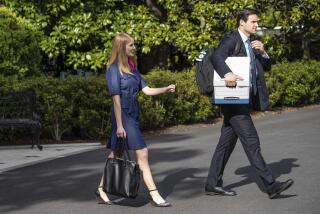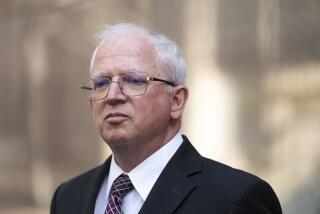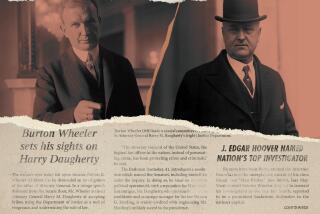Jury Convicts Deaver of Three Perjury Counts : Ex-White House Aide Faces Up to 15 Years in Prison, Plus Fines
- Share via
WASHINGTON — Former White House aide Michael K. Deaver was convicted Wednesday of three counts of perjury for giving false testimony to a congressional subcommittee and a federal grand jury last year about his Washington lobbying activities.
At the same time, the jury in the court of U.S. District Judge Thomas Penfield Jackson acquitted Deaver, 49, of two other perjury counts. Sentencing was set for Feb. 25, with Deaver facing a maximum punishment of 15 years in prison and $22,000 in fines.
Deaver, once a close confidant of President Reagan and his wife, Nancy, stood with his head slightly bowed as jury foreman Barrington B. Bell, a government supply clerk, announced the verdict. Deaver’s wife, Carolyn, and daughter, Amanda, 17, wept softly and embraced each other.
‘Very Disappointed’
A grim-faced but composed Deaver later told reporters outside the courthouse: “I’m obviously very disappointed . . . but I know in my heart that I’m innocent.
“This has been a long ordeal for my family,” he added. “And I’m grateful for all the strength and support I’ve been given by so many people around this country and my friends.”
Herbert J. Miller Jr., Deaver’s chief attorney, said he would appeal the verdict.
In a statement released by the White House, President Reagan said that he and the First Lady were “sorry to learn of the jury’s decision” on his former deputy chief of staff.
“He has been a longtime friend and served with dedication,” the President said. “Beyond that, I cannot comment because the decision is likely to be appealed through the court system.”
Deaver served Reagan for nearly 20 years, starting with his first term as California’s governor.
Miller refused to specify what grounds he would cite in his appeal, saying that they “will be spelled out in my filing.”
Separately, Deaver’s lawyers have lodged a constitutional challenge to the 1978 Ethics in Government Act, under which Deaver’s prosecutor was appointed. That challenge, which is pending in a circuit court, also could result in the conviction’s being set aside.
Deaver was the first current or former government official to be prosecuted by an independent counsel appointed under the post-Watergate ethics law.
Nofziger Trial Pending
Lyn Nofziger, also a former Reagan aide, was indicted on conflict-of-interest charges under the law in July and is scheduled to go on trial next month. Other former officials have been cleared by independent counsel investigations or are the subject of investigations that are still in progress, such as the principal figures in the Iran-Contra scandal.
In light of Deaver’s conviction on three counts, Miller acknowledged to reporters that he may have erred by abruptly resting the defense’s case without calling any witnesses after the prosecution had presented evidence for six weeks and called 52 witnesses.
“We didn’t put on a defense because we didn’t think we had to,” said Miller, who had declared that the prosecution’s case was so flawed it was unworthy of rebuttal. “The jury verdict suggests I may have made a mistake.”
Deaver, who left government service in May, 1985, to establish a Washington lobbying firm, was convicted of falsely denying to a congressional investigating subcommittee that he had helped arrange a personal visit with Reagan for a South Korean trade envoy. At the time of the October, 1985, visit, Deaver was negotiating a lobbying contract with the Korean government.
Grand Jury Testimony
He was also convicted of falsely telling a grand jury that he could not recall contacting any government officials on behalf of Trans World Airlines, another of his clients, or certain Administration officials on behalf of a business client who was seeking to preserve a federal tax break for firms with investments in Puerto Rico.
Deaver was cleared of charges that he lied to the subcommittee about White House contacts on behalf of the Boeing Co., Phillip Morris Inc. and several other clients; and to the grand jury about his involvement in Canadian acid rain policy while he was still on the White House staff.
Bell and two other members of the jury, which deliberated for 27 hours over four days, said in interviews that they had pored over the evidence to sort out which counts the government had proved and which it had not.
“We just went by the evidence, and it was quite clear,” said juror Janice Mae Hale, a supermarket food service manager. Added Carole L. Birckhead, a supervisor for the Army Corps of Engineers: “We tried to be very careful, very deliberate and very hard-working.”
Bell called the deliberations “intense, and I mean intense.”
Case Built on Perjury Issue
The prosecution’s case against Deaver was unusual because it was built on perjury charges alone and contained no substantive charges alleging violations of federal ethics or conflict-of-interest statutes. The prosecution apparently concluded that the government officials Deaver contacted were not technically his direct colleagues at the White House and therefore that the ethics law’s restrictions on contacts with former government associates may not have applied.
The charges focused largely on Deaver’s responses of “I don’t recall” to the two panels’ questions about his lobbying contacts.
Independent counsel Whitney North Seymour Jr. argued during the trial that Deaver remembered them well but lied to protect his old friends and colleagues in government from embarrassment and from public scrutiny.
The defense, in its cross-examination of witnesses, attempted to elicit testimony that Deaver was often confused and forgetful.
Miller had told jurors at the beginning of the trial that Deaver’s memory of some key events had been clouded by alcoholism, but no medical evidence of his alcoholism was introduced because the defense chose to rest without calling witnesses.
In deciding not to put on a defense, one source close to Deaver said, the defense team was concerned that Deaver, under cross-examination by prosecutors, might become confused and further hurt his case.
Testimony by Officials
The trial included testimony from many current and former high-ranking Administration officials and disclosed the extent of Deaver’s lobbying access to the Reagan inner circle.
Deaver had sworn to federal investigators last year that he did not recall contacting such Administration figures as Robert C. McFarlane, Reagan’s former national security adviser, to seek help for U.S. firms that wanted to keep special tax breaks for doing business in Puerto Rico.
At the trial, McFarlane testified that Deaver had talked to him, and Secretary of State George P. Shultz said Deaver had dropped by his office to discuss the same issue.
Although confirming the contacts, McFarlane and Shultz, as well as other witnesses, said they did not believe Deaver’s calls were improper or exerted undue influence on government decisions.
More to Read
Get the L.A. Times Politics newsletter
Deeply reported insights into legislation, politics and policy from Sacramento, Washington and beyond. In your inbox twice per week.
You may occasionally receive promotional content from the Los Angeles Times.








